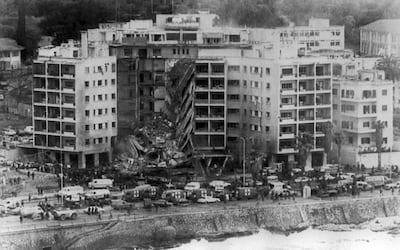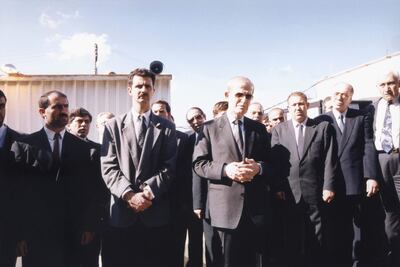Recently, the American newspaper columnist Marc Thiessen wrote a piece on the debacle of the US withdrawal from Afghanistan. Mr Thiessen’s argument was that the fiasco in Kabul was much more a repeat of the withdrawal of US Marines from Beirut in 1984 than of the humiliating pull-out from Saigon in April 1975.
For him, the departure from Lebanon, after bomb attacks against the US embassy building in April 1983 and against a Marines barracks that killed 241 personnel the following October, emboldened America’s enemies, notably Osama bin Laden, emboldened America’s enemies, notably Osama bin Laden. “[I]f we pull out [of Afghanistan] on August 31 with our tail between our legs,” he wrote, “it will send a signal of weakness certain to inspire terrorists around the world.”

Mr Thiessen’s distress is understandable. But had he taken his argument a bit further, he might have seen that it was not so much the withdrawal from Lebanon itself that made a difference, even if it did encourage bin Laden, but the choices that Washington made in preparing its exit from the country and how they affected the aftermath.
By pulling out, the Reagan administration effectively sub-contracted Lebanon to Syria, and by extension Iran, a situation that continued under the George W Bush and Clinton administrations. This had far-reaching consequences. In the years after 1984, leading up to the Syrian withdrawal from Lebanon in 2005, Damascus played a central role in arming and reinforcing Hezbollah and advancing Iran’s interests in the Levant. While the costs may not have been as dramatic as the bombing of the Pentagon and the World Trade Centre, they are far more difficult to resolve.
Even if the US is disengaging from the broader Middle East, it still has significant stakes in the region. Iran’s bid for regional expansion in places such as Lebanon, Iraq, and Yemen has threatened US allies, notably Israel and Gulf states. It also has the potential to destabilise global oil markets, with a negative knock-on effect for the US economic revival in a period after Covid-19. Furthermore, regional tensions could increase the probability of war or even a nuclear arms race, greatly affecting the region and beyond.
Hezbollah’s rise in Lebanon took place during the 1990s, when the group was protected by Syria, then the dominant power in the country. Hezbollah not only expanded its military capacities, it also became party to a formal agreement in April 1996, negotiated by former US secretary of state Warren Christopher, that established rules of engagement between the party and Israel. The document gave Hezbollah considerable legitimacy.
Not only did the Clinton administration implicitly recognise Hezbollah as a major actor on the Lebanese scene, but foreign officials continued to bless the Syrian order that made this possible. When Mr Christopher negotiated the April Understanding, or the 1996 Israeli-Lebanese Ceasefire Understanding, he did so in Damascus, not Beirut. Washington would not deviate from this approach, knowing that serious Lebanese business had to be concluded with the Syrian president at the time Hafez Al Assad.

By 2006, Hezbollah had turned into a major headache for the US, many Arab states, and Israel. The month-long war with Israel that year showed the party’s ability to remain a potent fighting force despite vast Israeli military superiority. The party’s capacities only increased in the 15 years since the end of the war, with Hezbollah developing precision guidance missiles, drones and a significant tunnelling capability.
While a future war is likely to be devastating for Lebanon, the country’s disastrous financial and economic situation probably means that Hezbollah would be able to survive such a conflict and impose its will on the rest of society afterwards.
In other words, while some like Mr Thiessen regard the American withdrawal from Beirut as the disaster, it was Washington’s assumption that the pull-out would bring a neat conclusion which was false. The political order the US encouraged by withdrawing was much more challenging to its interests and those of its allies in the long term. Foundational moments – such as the departure from Beirut or the retreat from Kabul – garner criticism, but the nature of what comes afterwards often matters more.
More proof of this is what happened in Afghanistan in 1989. The US imagined it had reached some sort of convenient resolution after winning the proxy war against the Soviet Union. It chose to disengage from the country rather than stabilise it. This would have been expected after the Americans had contributed to Afghanistan’s destruction by arming mujahideen groups, but it was not to be.
The ultimate outcome would be civil war, the Taliban takeover in 1994, Osama bin Laden’s return, and his use of the country to mount attacks against New York and Washington in September 2001. This would provoke the post 2001 US-led intervention that lasted for two decades. Each of these developments could have potentially been avoided.
The unforeseen impacts of bad choices often derive from an assumption that those choices will bring serene finality. The botched US pull-out from Afghanistan will be remembered for a long time, but what matters more is what the Biden administration helps to put in place once this phase is over. It will have to think this through carefully and not bring about a situation that means less security for Afghanistan and everyone else.


